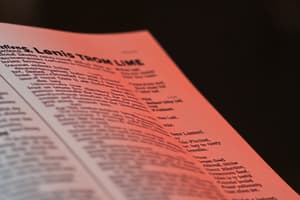Podcast
Questions and Answers
What is the main difference between traditional and digital texts?
What is the main difference between traditional and digital texts?
- Traditional texts are antique texts given new formats with multimedia elements
- Digital texts are more interactive
- Traditional texts are finished products while digital texts are processes and products (correct)
- Digital texts have multimedia elements while traditional texts do not
What is the significance of electronic textuality?
What is the significance of electronic textuality?
- It is a way to digitize antique texts
- It is a new system of representation with a mathematical dimension (correct)
- It is a new genre of literature
- It is a way to produce multimedia elements in texts
What is the range of digital composition of texts?
What is the range of digital composition of texts?
- All of the above (correct)
- Texts with audio and transcription functions
- Only fully digital texts with multimedia devices
- Only traditional texts produced digitally
What is digital literature?
What is digital literature?
What is the relationship between digital and conventional texts?
What is the relationship between digital and conventional texts?
What are the features of digital texts?
What are the features of digital texts?
What is the significance of postmodernism and poststructuralism in understanding text and textuality?
What is the significance of postmodernism and poststructuralism in understanding text and textuality?
Study Notes
Understanding Textuality in the Digital Age
- Poststructuralism and Postmodernism changed the way we understand text and textuality.
- Text expanded to include production, dissemination, and reception processes.
- Text is now seen as a process rather than a finished object.
- Electronic textuality involves a new system of representation with a mathematical dimension.
- Digital text has a double dimension of process and product.
- Digitized texts are antique texts given new formats with multimedia elements.
- Digital literature is created with a new digital logic provided by computers and electronic mediums.
- Digital literature introduces new genres and reading experiences.
- Digitized literature includes audio and transcription functions and explanatory windows.
- Gradation in digital composition of texts ranges from traditional texts produced digitally to fully digital texts with multimedia devices.
- Digital texts include links, images, music, interactivity, animation, and collective writing.
- The boundaries between digital and conventional texts are defused.
Studying That Suits You
Use AI to generate personalized quizzes and flashcards to suit your learning preferences.
Description
Test your knowledge on the evolution of text and textuality in the digital age with this informative quiz. From poststructuralism to digital literature, explore the new ways in which text is perceived as a process rather than a finished object. Discover the mathematical dimensions and multimedia elements of electronic textuality, as well as the introduction of new genres and reading experiences. Explore the gradation in digital composition and the defusion of boundaries between digital and conventional texts. Sharpen your understanding of textuality in the digital age




